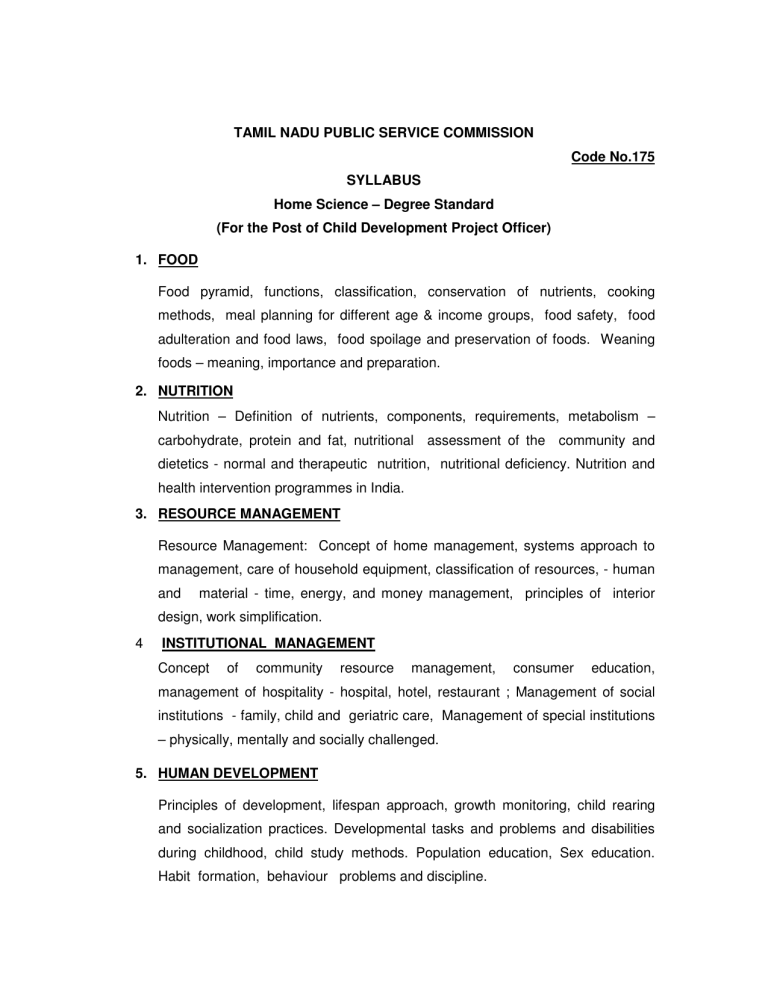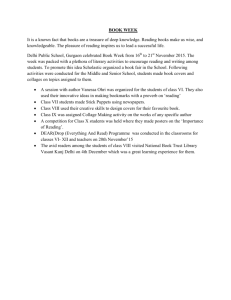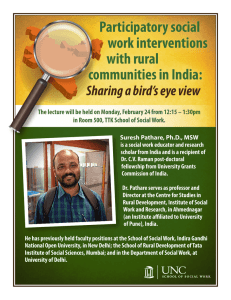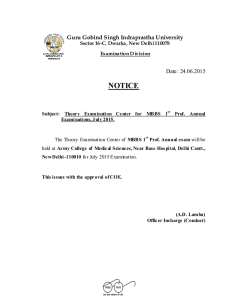Document 14122295

TAMIL NADU PUBLIC SERVICE COMMISSION
Code No.175
SYLLABUS
Home Science – Degree Standard
(For the Post of Child Development Project Officer)
1. FOOD
Food pyramid, functions, classification, conservation of nutrients, cooking methods, meal planning for different age & income groups, food safety, food adulteration and food laws, food spoilage and preservation of foods. Weaning foods – meaning, importance and preparation.
2. NUTRITION
Nutrition – Definition of nutrients, components, requirements, metabolism – carbohydrate, protein and fat, nutritional assessment of the community and dietetics - normal and therapeutic nutrition, nutritional deficiency. Nutrition and health intervention programmes in India.
3. RESOURCE MANAGEMENT
Resource Management: Concept of home management, systems approach to management, care of household equipment, classification of resources, - human and material - time, energy, and money management, principles of interior design, work simplification.
4 INSTITUTIONAL MANAGEMENT
Concept of community resource management, consumer education, management of hospitality - hospital, hotel, restaurant ; Management of social institutions - family, child and geriatric care, Management of special institutions
– physically, mentally and socially challenged.
5. HUMAN DEVELOPMENT
Principles of development, lifespan approach, growth monitoring, child rearing and socialization practices. Developmental tasks and problems and disabilities during childhood, child study methods. Population education, Sex education.
Habit formation, behaviour problems and discipline.
6. RELATIONSHIPS
Early stimulation, activities during infancy, early childhood, childhood and adolescence, child welfare programmes. Structure of family and its functions.
Family crises, Guidance and counseling, Schools and community relationships.
Family and legal issues.
7. FUNDAMENTALS OF TEXTILES
Principles of clothing construction, factors in selection of fabrics and garments, identification and properties of fibres, care and maintenance of garments, principles of textile designing, stain removal, dyeing , printing and finishing of fabrics; socio - psychological aspects of clothing.
8 EXTENSION
Concept of Extension – Principles and scope; formal, non-formal and vocational education; programme planning for women and children and transaction, elements of communications, methods of communication; ICDS programme and role of different functionaries.
9 DEVELOPMENT
Concept of Development, early experiments in rural development; national programmes for women and children; orientation to problems and issues in rural and urban development. Community based Institutions – Village Panchayats,
Schools, and Primary Health Centres; Science and Technology for rural development; Health promotion, environmental sanitation, waste disposal and recycling.
10 RESEARCH
Research in Social Science – concept and methods; Project proposal preparation, tools of research, concept of evaluation, steps in evaluation and report writing.
3.
4.
1.
2.
Reference Books
Lalitha , N. (2004) Rural
Encyclopedia of Rural Development .
Palanithurai, G (ed) (1995) New Panchayati Raj System in India , New Delhi:
Kanishka Publishers.
Pankajam, G. (2000) Extension – Third Dimension of Education Gyan
Publishers, New Delhi.
Development – Emerging Issues and Trends (Vol. .II) ,
New Delhi Dominant Publications.
Laxmi Devi ( 2000)
5. Kothari, CR (2000) Research Methodology: Methods and Techniques, Wishwa
Prakashan, New Delhi.
6.
7.
8.
Gupta S. (2001) Research Methodology and Statistical Techniques, Deep and
Deep, New Delhi.
Bell. J ( 1997) How to Complete your Research Project Successfully: A Guide for First time Researchers UBSPD, New Delhi.
Srilakshmi,B. (2006), “FOOD SCIENCE”, New Age International (P) Limited, New
Delhi.
9. Swaminathan,M. (2000), 2 nd
Edition, “ADVANCED TEXT BOOK ON FOOD AND
NUTRITION”, The Bangalore Press Printing, Bangalore.
10. Mahtab S. Bamji et al ( 2003), 2 nd
Ed. ‘TEXT BOOK OF HUMAN NUTRITION”,
Oxford & IBH Publishing Co (P) Limited, New Delhi.
11. Srilakshmi,B. (2005), 4 th
Ed. “DIETETICS”, New Age International (P) Limited,
New Delhi.
12. Srilakshmi,B. (2006), 4
TH
Ed., NUTRITION SCIENCE”, New Age International
(P) Limited, New Delhi.
13. Seema Yadav (1997), “BASIC PRINCIPLES OF NUTRITION”, Anmol Publication
(P) Limited.
14. Antia, F.P. and Philip Abraham ( 2002), “CLINICAL DIETETICS and NUTRITION,
Oxford University Press.
15. Potter, N.M and Brich G.G. ( 1986), “FOOD SCIENCE”, West Port Conn.
16. Jelliffee, B.B. ( 1989), “ASSESSMENT OF THE NUTRITIONAL STATUS OF
THE COMMUNITY”, WHO, Geneva.
17. Digumathi Bhaskara Rao ( 1990), COMMUNITY AND SCHOOL NUTRITION
EDUCATION, Discovery Publishing House, New Delhi.
18. Mohanty.J, Mohanty.B (2000). “Early Chilhood Care & Education”. Deep & Deep
Publications, New Delhi.
19. Rajammal, P. Devadass, N.Jeya (1984). “A Text Book on Child Development”.
Macmillan India Ltd., New Delhi.
20. Valda Reynolds Cert.Ed (1987). “ A practical Guide to Child Development –
Volume 1 : The Child”. Stanley Thornes Ltd.
21. Pankajam, G. (2004). “Pre-School Education Philosophy and Practice”. The concept Publications New Delhi.
22. Pankajam, G. (2004) Know Your Child - Concept publication, New Delhi.
23. Pankajam, G.(2009). Care and Education of Differently Abled. Concept publication, New Delhi.
24. Suriakanthi, A. Child Development – An Introduction – Gandhigram.
25. Susheela Dantyagi (2006). “Fundamentals of textiles and their care”. Orient
Longman Pvt Ltd.
26. Bernard P. Corbman (1985). “Textiles”. McGraw Hill.
27. Eda Augusta Jacobson, Helen E McCullough (1948). “Fundamentals of Textiles”.
J.Willey & Sons.
28. “Encyclopedia of Textiles” (1973), Doric Publishing Co., Prientice Hall Inc.
29. Torna P.G. (1987) “Understanding Textiles” Macmillan publishing INC, NewYork.
30. Hollen, N and Saddler. J. ( No. Date) “ Textiles”, Macmillion & Co, NewYork.
31. Joseph M.L. (1976) “Essentials of Textiles” Holt Ripedraft of Winston – NewYork.


